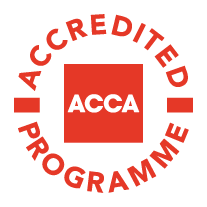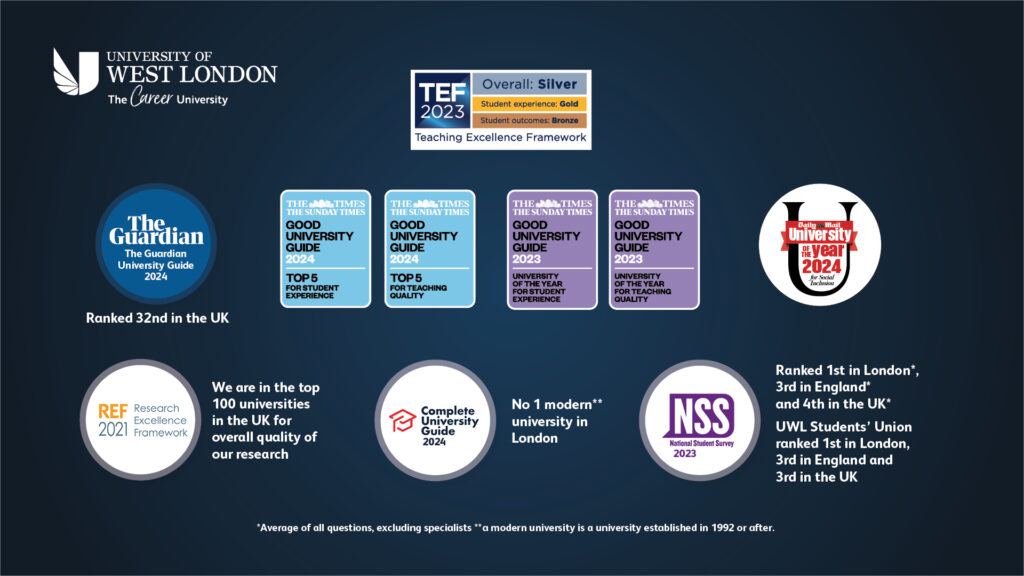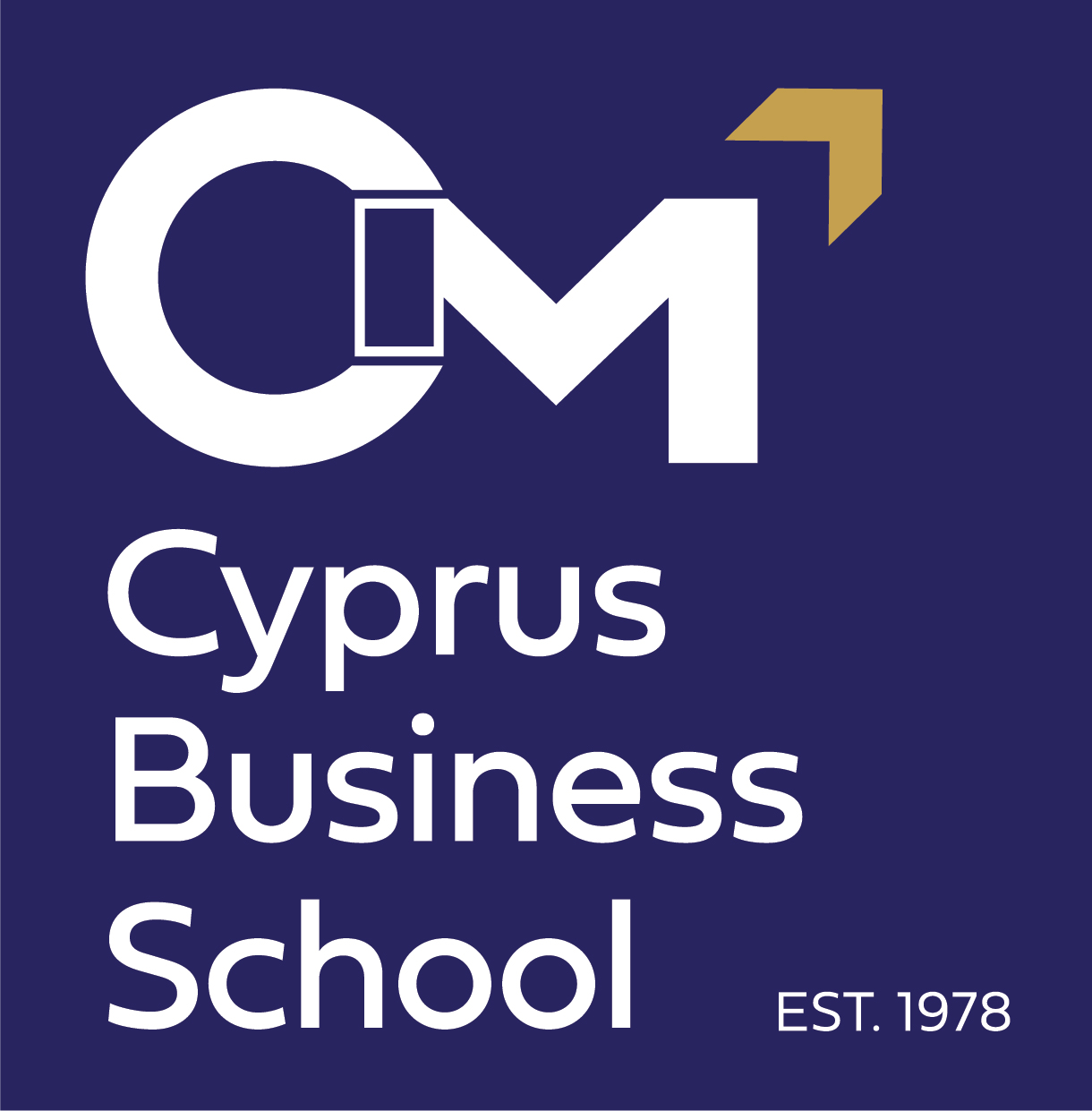UWL BA (Hons)
Accounting and Finance
(3 Years)

Overview
Subjects
Assessment
Course Objectives
On this Accounting and Finance course you will
learn essential principles while developing the
practical skills you need to succeed.
Our professionally qualified tutors all have industry experience, most of them with the Big Four accounting firms; with their guidance you will grow your understanding of current practices.
As a team, we do everything we can for our students, but do not take our word for it. Since the student satisfaction ratings were first introduced, this course has frequently featured in the top ten accounting degrees in the country.
Alongside your specific professional abilities, we will encourage you to develop the transferable skills that will help you to stand out to potential employers. These include analytical, research and communication skills.
All our teaching staff pride themselves on putting students first, and you will always have academic support when you need it. Your tutors will work with you as an individual to make the most of your career opportunities.
You will listen, learn, discuss and gain hands-on experience of how business and finance work through:
lectures / seminars / tutorials / workshops.
When you graduate, provided you have passed specific accredited optional modules at Level 6/ Year 3, you will be awarded up to nine exemptions from ACCA and it is possible to become an ACCA-qualified accountant within two years of graduation.
Our professionally qualified tutors all have industry experience, most of them with the Big Four accounting firms; with their guidance you will grow your understanding of current practices.
As a team, we do everything we can for our students, but do not take our word for it. Since the student satisfaction ratings were first introduced, this course has frequently featured in the top ten accounting degrees in the country.
Alongside your specific professional abilities, we will encourage you to develop the transferable skills that will help you to stand out to potential employers. These include analytical, research and communication skills.
All our teaching staff pride themselves on putting students first, and you will always have academic support when you need it. Your tutors will work with you as an individual to make the most of your career opportunities.
You will listen, learn, discuss and gain hands-on experience of how business and finance work through:
lectures / seminars / tutorials / workshops.
When you graduate, provided you have passed specific accredited optional modules at Level 6/ Year 3, you will be awarded up to nine exemptions from ACCA and it is possible to become an ACCA-qualified accountant within two years of graduation.

Benefits
The course provides the maximum exemptions
(9 papers) from the ACCA examinations. There
is no University that receives a higher number of
exemptions.
Aims
Our aim is to produce graduates with all the skills
and abilities needed to flourish in the world of
Accounting and Finance. You will leave with all
you need to start a career. This degree provides
a fantastic basis for all professional qualifications,
including those offered by the Association of
Chartered Certified Accountants (ACCA), the
Chartered Institute of Management Accountants
(CIMA), the Institute of Chartered Accountants
(ICA), and the Institute of Credit Management (ICM).
Teaching Methods
How you learn is almost as important as what you
learn. It’s our job to make sure that we give you
all the information that you need in as interesting
and varied a way as possible. There will be
lectures, seminars, tutorials and workshops, where
you will listen and learn, discuss and gain handson experience.
Accounting as a subject is constantly changing in order to adapt to the needs of modern-day business. This course has been designed to keep up with these changes.
Successful completion of this degree will enable you to pursue a career in Financial Accounting, Management Accounting, Corporate Finance, Taxation and Auditing.
The BA (Hons) Accounting and Finance Programme of the UWL has been consistently ranked in the top 10 of all the UK universities in the National Student Survey.
Accounting as a subject is constantly changing in order to adapt to the needs of modern-day business. This course has been designed to keep up with these changes.
Successful completion of this degree will enable you to pursue a career in Financial Accounting, Management Accounting, Corporate Finance, Taxation and Auditing.
The BA (Hons) Accounting and Finance Programme of the UWL has been consistently ranked in the top 10 of all the UK universities in the National Student Survey.
Exemptions from Professional Bodies
Holders of the BA degree in Accounting and
Finance are eligible for maximum exemptions
from ACCA (9 out of 14) and 5 exemptions from
CIMA’s Certificate level.
Recognition
The above programme is recognised by UK
NARIC. It is also recognisable by KYSATS and thus
qualifies for a subsidy by the Cyprus government
of up to €3,417.
Facts and achievements
- University of the Year for Student Experience and University of the Year for Teaching Qualityin The Times and Sunday Times Good University Guide 2023
- Number 32 out of 121 universities nationwide in The Guardian University Guide 2024.
- Ranked 1st in London, 3rd in England and 4th in the UK in the National Student Survey 2023*.
- University of the Year for Social Inclusion in the Daily Mail University Guide 2024
- Employability – Our career-focused courses will allow to immerse yourself in your chosen career before you even graduate.
- Diversity – We have one of the most diverse student populations in the country.
*Average of all questions, excluding Specialists
Why study this course?
This accounting and finance degree at the
University of West London will help you gain both
knowledge and practical experience.
You will learn from professional accountants who will support your academic and career goals, equipping you to compete in the financial jobs market.
The course is designed to maximise exemptions from the exams set by professional accountancy bodies such as the Association of Chartered Certified Accountants (ACCA).
This means you will sit fewer ACCA exams and you could shorten the length of time it takes you to gain your professional qualification.
You will learn from professional accountants who will support your academic and career goals, equipping you to compete in the financial jobs market.
The course is designed to maximise exemptions from the exams set by professional accountancy bodies such as the Association of Chartered Certified Accountants (ACCA).
This means you will sit fewer ACCA exams and you could shorten the length of time it takes you to gain your professional qualification.
Commencement
All UWL programs commence only in September
and January, subject to demand.
Year 1
1. Introduction to Financial Accounting
2. Digital Skills for Accountants
3. Quantitative Methods
4. Introduction to Management Accounting
5. Introduction to Economics
6. Introduction to Sustainability in Accounting
Year 2
1. Auditing in Context
2. Financial Accounting
3. Taxation
4. Business and Corporate Law
5. Financial Management
6. Management Accounting
Year 3
Compulsory
1. Corporate Finance
2. Financial Reporting
3. Performance Management and Control
Optional
4. Auditing
5. Personal and Corporate Taxation
6. Analysis Report on Current Issues in Accounting and Finance
7. Blockchain Technologies in Finance
Module Aims
Year 1
The module aims to develop knowledge and understanding of the underlying principles and concepts relating to financial accounting and technical proficiency in the use of double-entry accounting techniques including the preparation of basic financial statements. Upon successful completion of this module, you should have a solid base from which to continue onto Level 5/Year 2 Financial Accounting and Level 6/Year 3 Financial Reporting.
The aim of this module is to provide you with a range of digital skills required to succeed in the workplace as well as throughout your studies. You will be introduced to research skills and methods in the field of accounting and finance, both of a quantitative and qualitative nature. You will also learn to critique, prepare and present findings in an impactful manner to specialist and nonspecialist audiences, and reference your findings
using the Harvard referencing system.
You will also develop data analysis and general IT skills through spreadsheet modelling and using accounting software which are essential for accountants. You will be exposed to social media platforms for professional networking (Eg: LinkedIn), learn to use online platforms (Eg: Canva) to design your CV, and engage in careerfocused activities.
You will also develop data analysis and general IT skills through spreadsheet modelling and using accounting software which are essential for accountants. You will be exposed to social media platforms for professional networking (Eg: LinkedIn), learn to use online platforms (Eg: Canva) to design your CV, and engage in careerfocused activities.
The module aims to provide an understanding of the role of data analysis in business and finance.
Develop basic analytical and numerical skills into an ability to approach and solve business problems and develop the ability to interpret numerical results as an aid to decision-making.
Develop basic analytical and numerical skills into an ability to approach and solve business problems and develop the ability to interpret numerical results as an aid to decision-making.
The module aims to develop knowledge and understanding of management accounting techniques to support management in planning, controlling and monitoring performance in a
variety of business contexts. Upon successful completion of the module, you should have a solid base from which to continue on Level 5/Year 2 Management Accounting and Level 6/Year 3 Performance Management and Control.
The aim of the module is to help you to develop an awareness of the economic environment in which business operates, within a local, national and international context.
This module aims to give you a deeper understanding of sustainable business operations and the important role played by professional accountants in helping companies embed sustainability into their corporate strategies to deliver long-term value to stakeholders. The module also explores the important role of data analytics in sustainable business practices.
Year 2
The aim of this module is to enable you to demonstrate an understanding of auditing principles and regulations in a business context for organisations in the UK. You will learn to apply the audit procedures in a variety of simple practical situations. Upon successful completion of this module, you should have a solid base from which to continue onto Level 6/Year 3 Auditing.
The aim of the module is to build and further develop the knowledge and skills taught in Level 4/Year 1/Year 1 Introduction to Financial Accounting. You will gain a deeper
understanding of applying accounting standards and the theoretical framework in the preparation of financial statements of entities, and how to analyse and interpret those financial statements.
Upon successful completion of the module, you should have a solid base from which to continue onto Level 6/Year 3 Financial Reporting.
Upon successful completion of the module, you should have a solid base from which to continue onto Level 6/Year 3 Financial Reporting.
The module aims to develop knowledge and skills relating to the tax system as applicable to individuals. Upon successful completion of this module, you should have a solid base from which to continue on to Level 6/Year 3 Personal and Corporate Taxation.
The module aims to develop knowledge and skills in understanding the general legal framework and specific legal areas relating to business, recognising the need to seek further specialist legal advice where necessary.
The module aims to develop the knowledge and skills expected of a finance manager, in relation to investment, financing, and dividend policy decisions. Upon successful completion of this module you should have a solid base from which to continue on to Level 6/Year 3 Corporate Finance.
The module aims to build on knowledge and skills taught at Level 4/Year 1/Year 1 (Introduction to Management Accounting) and develop an understanding of management accounting techniques to support management in planning, controlling and monitoring performance in a variety of business contexts. Upon successful completion of this module, you should have a solid base from which to continue onto Level 6/Year 3 Performance Management and Control.
Year 3
Compulsory:
This module builds on knowledge and skills taught at Level 5/Year 2 (Financial Management) and aims to develop the skills expected of a finance manager, in relation to investment, financing, and dividend policy decisions.
The aim of the module is to build and further develop knowledge and skills taught at Level 4/Year 1/Year 1 (Introduction to Financial Accounting) and Level 5/Year 2 (Financial Accounting) in understanding and applying accounting standards and the theoretical framework in the preparation of financial statements of entities, including group entities, and how to analyse and interpret those financial statements.
The module aims to build on knowledge and skills taught at Level 4/Year 1 (Introduction to Management Accounting) and Level 5/Year 2 (Management Accounting and develop knowledge) helping develop skills in the application of management accounting techniques to quantitative and qualitative information for planning, decision-making, performance evaluation, and control.
Optional:
This module builds on Level 5/Year 2 Auditing in Context and aims to enable you to demonstrate a detailed understanding of auditing principles and procedures applicable to business organisations and to select and apply those procedures in a variety of practical situations.
The module aims to build upon the knowledge and skills gained at Level 5/Year 2 (Taxation) and develop knowledge and skills relating to the tax system as applicable to individuals, single companies, and groups of companies.
The module aims to enable you to engage in a knowledge-based debate with your peers on selected current issues in accounting and finance.
This is not a taught module, it is a research project that focuses on the current issues in the accounting and finance profession.
The module aims to demystify the world of blockchain technology for accountants and will enable you to get to grips with technological advances and digital disruptors, give a clearer understanding of what they mean to the role of a professional accountant, and how to make informed decisions about adopting and using new technologies.
Assessment
Year 1
Introduction to Financial Accounting
Written Assignment 40%,
Written Examination 60%
Digital Skills for Accountants
Portfolio 100%
Quantitative Methods
Written Assignment 40%,
Written Examination 60%
Introduction to Management Accounting
Written Assignment 40%,
Written Examination 60%
Introduction to Economics
Written Assignment 40%,
Written Examination 60%
Introduction to Sustainability in Accounting
Artefact 100%
Year 2
Auditing in Context
Written Assignment 40%,
Written Examination 60%
Financial Accounting
Written Assignment 40%,
Written Examination 60%
Taxation
Written Assignment 40%,
Written Examination 60%
Business and Corporate Law
Written Assignment 40%,
Written Examination 60%
Financial Management
Written Assignment 40%,
Written Examination 60%
Management Accounting
Written Assignment 40%,
Written Examination 60%
Year 3
Corporate Finance
Written Assignment 40%,
Written Examination 60%
Financial Reporting
Written Assignment 40%,
Written Examination 60%
Performance Management and Control
Written Assignment 40%,
Written Examination 60%
Auditing
Written Assignment 40%,
Written Examination 60%
Personal and Corporate Taxation
Written Assignment 40%,
Written Examination 60%
Analysis Report on Current Issues in Accounting and Finance
Written Assignment 100%
Blockchain Technologies in Finance
Written Assignment 50%
Oral assignment 50%

Admission Requirements
- Secondary School
Leaving Certificate with average 15/20
AND
- 15/20 in Mathematics on the High School Leaving Certificate or equivalent.
- 15/20 in English on the High School Leaving
- English competency e.g. IELTS 5.5, GCSE C OR equivalent qualification.
Exemptions may be granted on a case by case basis.

Duration
3 years

Accreditation
Recognised by UK NARIC and KYSATS. Accredited by ACCA (9 out of 14 Exemptions)

